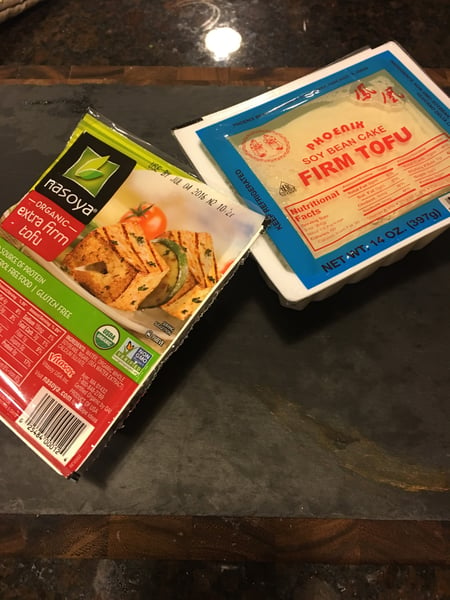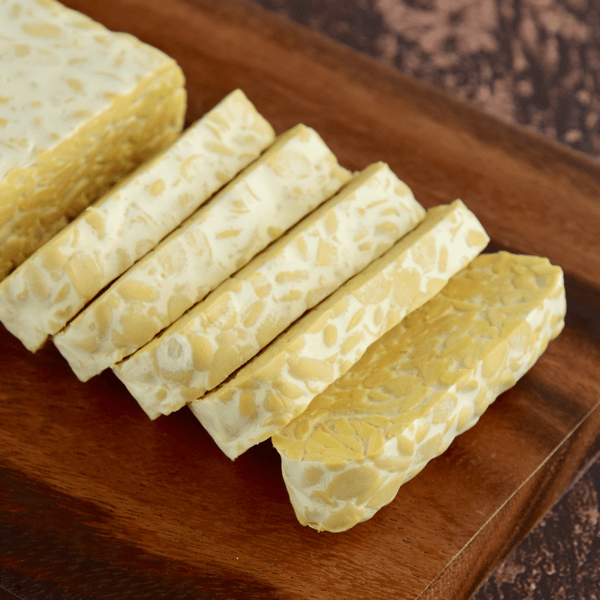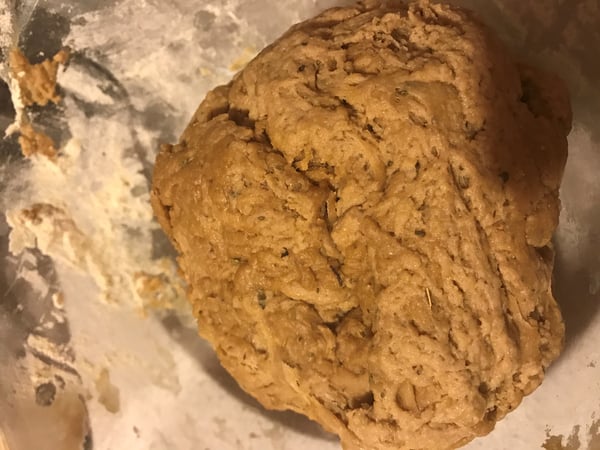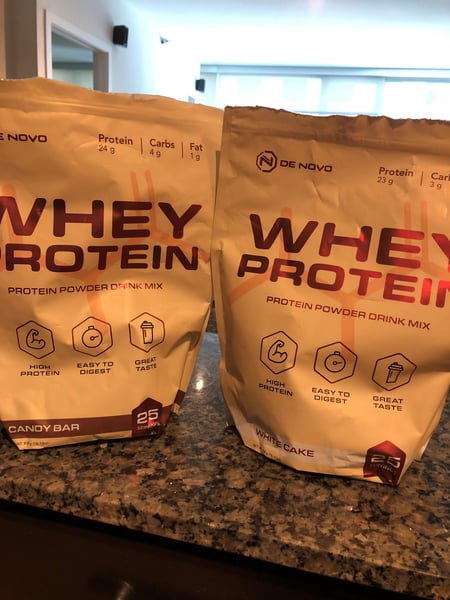Protein FAQs Part 3: Vegan Meat Substitutes and Protein Powders

This is the final post in a 3-part series about protein. Be sure to check out parts one and two before reading this one if you missed them.
“What are some good vegan sources of protein?”
A quick Google search for “best vegan protein sources” comes up with a bunch of stuff we have already determined to NOT be good protein sources, or “high ratio” protein sources, such as quinoa, oats, nuts and fruits. Just to reiterate once more, if something is getting the vast majority (75% or more) of its calories from carbs and fats, its going to be tough to stay within your calorie limits if you are picking them as your go-to proteins. That being said, there are several “meat substitute” foods that have good protein to total calorie ratios.
1. Tofu

This is probably the most popular of the meat substitutes. Tofu is made from crushed soybeans, and comes in many varieties and forms, all of which have different macronutrient profiles and different ways to be used in food. Firm tofu is the most “meat like”.
1/2 cup has:
- 94 calories
- 10g protein
- 2.3g carbs
- 6g of fat (43% calories from protein)
2. Tempeh

Like tofu, tempeh is also made from soybeans, this time by fermenting them into a cake-like form. There are also many different varieties of tempeh, made with multiple combinations of beans, wheat, and other grains. Tempeh is more easily digested than tofu and many beans and grains in general since it has already been fermented.
A 3.5 oz serving has:
- 192 calories
- 20.3g protein
- 7.6g carbs
- 10.8g fat (42% calories from protein)
3. Seitan

If you are allergic to soy or it bothers your stomach, you can opt for seitan, or “wheat meat”. Seitan is actually made from wheat gluten, which is literally the protein that all wheat contains (so if you have Celiac disease you’ll obviously want to stay away from this one). It has the meatiest texture, and also the best protein ratio of these examples.
3 oz of seitan has:
- 120 calories
- 21g protein
- 4g carbs
- 2g fat (70% calories from protein)
These are the 3 most popular meat substitutes, however there are all sorts of vegan products that are made with combinations of these examples, different beans, legumes, grains, etc. Just be sure to check the nutrition label to make sure you’re not getting a tiny protein ratio. Take the total grams of protein, multiply by 4, and divide by the total calories for your protein ratio.
“What kind of protein powder do you suggest?"
Walking around your local GNC can be very overwhelming as there are literally thousands of different brands of protein. Let's start off with the most common protein powder, whey. Whey is the most bioavailable protein there is, meaning that almost all the protein you consume will go to building muscle, versus needing to be burned off to digest the protein itself.

There are 3 main different types of whey protein: concentrate, isolate, and hydrolysate. What sets these different types of whey apart is how much they have already been broken down. Whey is actually the byproduct of cheese, it is the high protein remains of the remaining liquid from curdled milk.
Whey concentrate comes with some carbs and fat in addition to protein, so again check the labels to make sure you’re getting the vast majority of calories from protein. The benefit is that it also has a decent amount of vitamins and minerals along with the protein. Many “mass gainer” protein powders use whey concentrate, and I have to think most of our readers would prefer to be consuming excess calories from delicious foods and not powder, so unless you’re actively trying to gain considerable weight, make sure you don't accidentally buy one of these, as the packaging can look very similar to purely protein supplements.
Whey isolate has nearly all the fat and carbs removed, with usually 90-100% of the calories coming from protein, but also loses many of the micronutrients. Therefore, many brands add some vitamins and minerals back into the powder. This is the kind of protein I usually recommend for weight loss; if we’re supplementing our diet with powdered food it makes sense to have it come with as few extra calories as possible (side note- many proteins are a blend of concentrate and isolate).
Finally, whey hydrolysate is partially digested protein that is absorbed nearly instantly into the bloodstream. Most of the current research says that having this protein instantly into the bloodstream compared to waiting a while doesn't have that much of a difference, and this is the most expensive protein as well as the worst tasting and least filling, so unless you are a hardcore bodybuilder doing multiple lifting sessions a day I would advise not wasting your money on this one.
Using this knowledge, I recommend using whey isolate proteins and deciding if you want to splurge a bit to spend a little more money for better taste and consistency. You may also be fine with not quite as good tasting protein and being more economical. If you often mix your shakes with water immediately after working out like I do, I recommend DeNovo Nutrition whey. The plus is that the even mixed with water, the flavor is great and there is no “protein aftertaste”. The downside is that its a little pricey, $35 for 25 servings, and currently only comes in two flavors. If you like to cook with protein or make smoothies, or just want to save money, Optimum Nutrition Gold Standard is the way to go, coming in at $30 for 29 servings, with the option of buying in much larger tubs at a discount, and also has over a dozen different flavors.
The second most popular protein is casein, which is a milk byproduct and digests much slower than whey protein. Whey seems to be a better muscle builder than casein, mainly because the protein is absorbed quickly and enough gets into the bloodstream at once to max out protein synthesis, where as casein will take a lot longer to digest. Therefore it's a better option as an evening snack or between meals than it is as a post workout drink.
Here are some other non-vegan protein powders:
1. Egg protein
These are literally powdered egg whites. I personally don’t use them, mainly because they are far more expensive than whey, and have very little nutritional value as most of the micronutrients in an egg come from the yolk.
2. Beef protein
This is not powdered beef, it's more so the gelatin and collagen scraps of beef. This protein has gotten pretty popular due to it being “paleo”, but it's not a complete protein, meaning it does not contain all 9 essential amino acids. Here’s an article that goes into far greater depth on beef protein.
"What are the good vegan alternatives?”
Finally, let's get into some of the vegan protein powders. Like many vegan protein sources, some of these are going to be coming with a solid amount of calories coming from carbs and fats, so again you’ll have to be wary of this when selecting them. These are the four most common plant based protein powders, however there are many on the market that combine multiple sources, mainly because not all plants contain all the essential amino acids, so some are combined.
My personal experience with plant based protein powders is that they are much “sludgier” in consistency than whey/milk proteins, mainly due to the large amounts of fiber and carbs/fats that they come with. The best tasting (in my opinion) is Revere which is also a nice brand as they have different products geared towards different types of training. The largest downside to the vegan protein powders is the price, as they all seem to be substantially pricier than whey.
1. Pea protein
This would be the “best” option here for several reasons. For one, it has about an 85% protein to calorie ratio (one serving is 21g protein and 100 calories), and its also high in branched chain amino acids (BCAAs), which are the most important amino acids when it comes to building muscle. Most research has concluded that it's as effective as whey when it comes to building muscle.
2. Soy protein
Soy protein is one of the few plants that is a complete protein. The downsides are that it isn't easily digested in many people, especially when concentrated into a powder, and seems to be something many people are allergic to. My personal recommendation would be to try the soy meat alternatives first before using it to supplement with.
3. Rice protein
One of the cheapest plant based protein sources, rice protein is also pretty good when it comes to the protein ratio. Like pea protein, it's high in BCAAs and a great alternative to whey.
4. Chia protein
Chia seeds have tons of nutrition and fiber, and therefore their powdered form does too. Be wary of this when having a large shake of them before or right after your workout, but chia protein is high in a ton of vitamins and minerals.
5. Hemp protein
Hemp protein is chock full of vitamins, minerals, and healthy Omega-3 fatty acids, but therefore comes in at only about a 45% protein ratio.
There are a ton of ways to hit your protein requirements no matter what kind of diet you follow. I hope this 3-part protein post was helpful, and as always, don't hesitate to leave a question in the comments!
